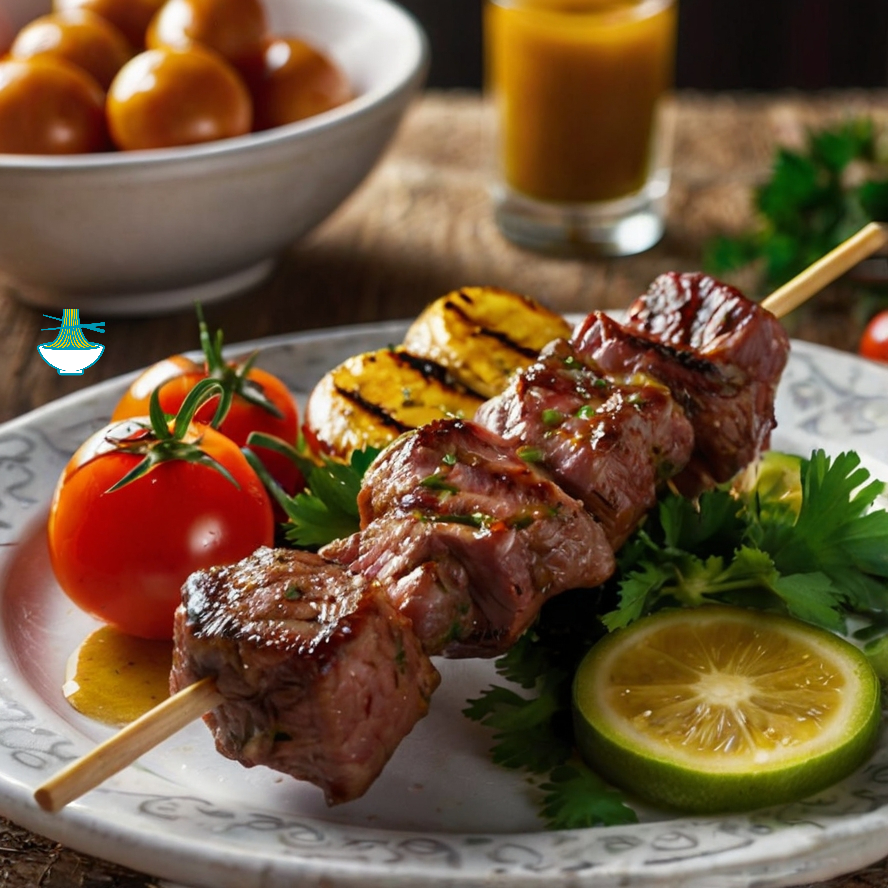Discover the tantalizing world of Espetada or Beef Skewers, a mouthwatering dish featuring succulent pieces of beef or pork skewered and grilled to perfection. 
Learn about the rich flavors, traditional preparation methods, and cultural significance of this beloved culinary delight.
Ingredients:
- 1.5 lbs (about 700g) of beef or pork (choose a tender cut like sirloin or tenderloin)
- 4 cloves of garlic, minced
- 1 tablespoon of paprika
- 1 tablespoon of dried oregano
- 1 teaspoon of salt
- 1 teaspoon of black pepper
- 1/4 cup of olive oil
- Wooden skewers, soaked in water for at least 30 minutes
Instructions:
1-Cut the meat into 1.5-inch (4 cm) cubes.
2-In a bowl, mix together the minced garlic, paprika, oregano, salt, pepper, and olive oil to create a marinade.
3-Add the meat cubes to the marinade, ensuring they are well coated. Cover the bowl and let it marinate in the refrigerator for at least 1 hour, or overnight for best flavor.
4-Preheat your grill to medium-high heat.
5-Thread the marinated meat cubes onto the soaked wooden skewers, leaving a little space between each piece.
6-Place the skewers on the grill and cook for about 10-15 minutes, turning occasionally, until the meat is cooked to your desired level of doneness and has a nice char on the outside.
7-Remove the skewers from the grill and let them rest for a few minutes before serving.
8-Serve the Espetada hot, either on its own or with side dishes like rice, salad, or grilled vegetables.
Enjoy your homemade Espetada!
Nutritional Values :
Beef or Pork (1.5 lbs):
- Calories: Approximately 1200-1500 kcal
- Protein: Approximately 90-120g
- Fat: Approximately 90-120g
- Carbohydrates: Negligible
benefits :
- Essential for muscle repair and growth.
- Supports immune function and hormone production.
- Helps keep you feeling full and satisfied, aiding in weight management.
- Promotes healthy hair, skin, and nails.
Fat (Monounsaturated and Polyunsaturated):
- Provides long-lasting energy.
- Supports brain health and cognitive function.
- Helps absorb fat-soluble vitamins (A, D, E, K).
- Contributes to hormone regulation and cell membrane structure.
- May reduce the risk of heart disease when consumed in moderation.
Carbohydrates:
- Main source of energy for the body.
- Provides fuel for physical activity and exercise.
- Supports brain function and concentration.
- Important for maintaining blood sugar levels.
- Dietary fiber found in carbohydrates aids in digestion and promotes gut health.
Garlic (4 cloves):
- Calories: Approximately 16 kcal
- Protein: Approximately 0.7g
- Fat: Approximately 0.1g
- Carbohydrates: Approximately 3.3g
benefits :
- Contains allicin, a compound with potent medicinal properties, including antibacterial and antiviral effects.
- May help lower blood pressure and improve cholesterol levels.
- Has antioxidant properties that protect against cell damage and aging.
- Supports immune function and may reduce the risk of common illnesses like the cold and flu.
Olive Oil (1/4 cup):
- Calories: Approximately 480 kcal
- Protein: Negligible
- Fat: Approximately 54g
- Carbohydrates: Negligible
benefits :
- Rich in monounsaturated fats, which are heart-healthy and may reduce the risk of heart disease.
- Contains antioxidants that reduce inflammation and protect against oxidative stress.
- Supports healthy cholesterol levels and may improve blood vessel function.
- Helps with weight management when used in place of saturated fats like butter or margarine.
Herbs and Spices (Paprika, Dried Oregano, Salt, Black Pepper):
Paprika (1 tablespoon):
- Calories: Approximately 20 kcal
- Protein: Approximately 1g
- Fat: Approximately 1g
- Carbohydrates: Approximately 4g
benefits :
- Rich in Antioxidants: Paprika contains antioxidants such as vitamin A and carotenoids (e.g., beta-carotene and lutein) that help protect cells from damage.
- Anti-Inflammatory: The capsaicin in paprika can reduce inflammation and help alleviate pain.
- Vitamin A: Paprika is an excellent source of vitamin A, which supports healthy vision, immune function, and skin health.
- Digestive Health: Paprika may aid in digestion by stimulating the production of digestive enzymes.
Dried Oregano (1 tablespoon):
- Calories: Approximately 5 kcal
- Protein: Approximately 0.2g
- Fat: Approximately 0.1g
- Carbohydrates: Approximately 1g
benefits :
- Antioxidant Properties: Oregano is rich in antioxidants like rosmarinic acid and thymol, which help combat oxidative stress and inflammation.
- Antimicrobial Effects: Oregano has natural antimicrobial properties that can help fight bacterial and fungal infections.
- Digestive Health: Oregano can improve digestion and alleviate symptoms like bloating and gas.
- Anti-Inflammatory: The compounds in oregano may help reduce inflammation and support overall health.
Salt (1 teaspoon):
- Calories: Negligible
- Protein: Negligible
- Fat: Negligible
- Carbohydrates: Negligible
benefits :
- Electrolyte Balance: Salt contains sodium, which is crucial for maintaining fluid balance, nerve function, and muscle contractions.
- Improves Flavor: Salt enhances the flavor of foods, which can make healthy meals more enjoyable.
- Preservation: Salt has been traditionally used to preserve foods, preventing spoilage and extending shelf life.
Black Pepper (1 teaspoon):
- Calories: Negligible
- Protein: Negligible
- Fat: Negligible
- Carbohydrates: Negligible
benefits :
- Antioxidant Properties: Black pepper contains piperine, which has antioxidant properties that help protect the body from free radicals.
- Digestive Health: Piperine stimulates the production of digestive enzymes, aiding in digestion and reducing bloating and gas.
- Nutrient Absorption: Black pepper enhances the bioavailability of nutrients, making them more accessible to the body.
- Anti-Inflammatory: The piperine in black pepper has anti-inflammatory effects that can help reduce inflammation in the body.
Remember, these values are estimates and may vary based on specific ingredients and portions used in your recipe. If you need more precise nutritional information, you can input the exact brands and quantities into a nutritional calculator or consult food packaging labels.


Comments